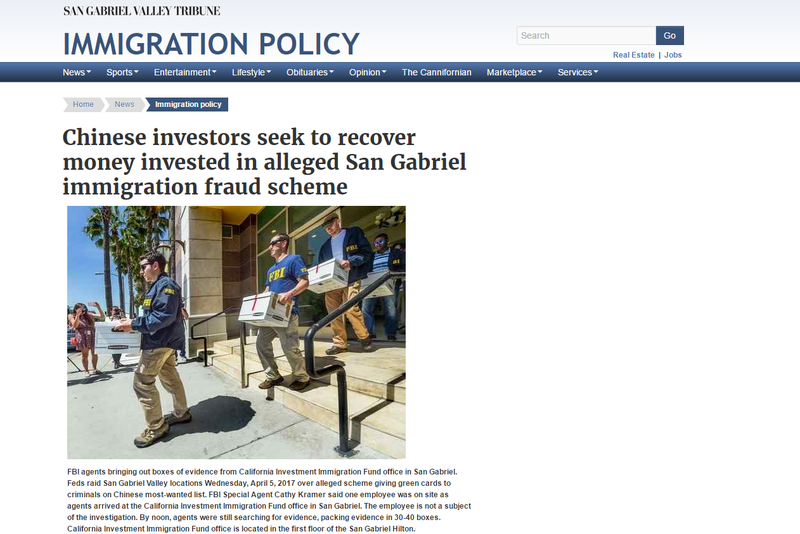Chinese investors seek to recover money invested in alleged San Gabriel immigration fraud scheme
Four Chinese investors who believed they were each investing $500,000 in U.S. businesses in return for green cards are suing a San Gabriel consulting firm to get their money back after FBI investigators alleged the scheme was a fraud.
The lawsuit, filed Friday in Los Angeles Superior Court, said that the operators of the California Investment Immigration Fund — lawyer Victoria Chan, her father Tat Chan and his wife Zheng Chan, business partner Fang Zeng and 20 other unnamed people — solicited payments of $550,000 to $600,000 from Yeqing Xia, Rui Zhang, Song Yao Li and Ting Li in return for visas through the federal EB-5 program.
The investors claim the firm took their money and spent it on luxury vehicles and homes, instead of putting the cash into job-creating businesses, as the visa program requires.
In April, agents from the FBI and the U.S. Department of Homeland Security searched and seized evidence at the CIIF office and the Chans’ homes in South El Monte and Arcadia. Neither agency made any arrests.
An FBI affidavit released in April showed federal investigators were seeking evidence of possible mail fraud, wire fraud, visa fraud and money laundering.
Among the items the agents wanted seized are client files, emails, computers, cellphones, immigration records, bank records, travel-related documents, deeds, documents on real estate deals, utility and cellphone bills, records of payments and documents associated with CIIF or its related companies.
Jing Wang, an attorney for the alleged victims, said CIIF’s scheme bilked several fugitives on Chinese government’s “most wanted” list seeking to flee to the U.S. The scheme returned some or all of the money to some investors, but others never saw their money again. Wang said her clients were in the latter group.
Wang said her clients fear they will be unable to extend their temporary green cards before they expire. She said her clients would gladly re-invest the money if they can recover it from the Chans and Zeng, and in doing so secure their immigration status, Wang said.
“Our clients are innocent victims and their conditional green card status is expiring this November,” Wang said. “We are working on to find out if there is a solution to maintain their I-526 status and reinvest into other new project.”
Despite coming under scrutiny recently, CIIF had previously earned praise from local elected officials.
As displayed on the windows of CIIF, the business and one of its aliases, the American Chinese Business Association, received commendations from former State Sen. Bob Huff, R-Brea, Assemblyman Ed Chau, D-Monterey Park, the Los Angeles County Board of Supervisors and the city of Alhambra.
In February, Sen. Dianne Feinstein, D-Calif., and Sen. Chuck Grassley, R-Iowa, introduced a bill that would eliminate the EB-5 program. Feinstein said in a statement the program, which has also been found to be rife with fraud and abuse, implies “that U.S. citizenship is for sale.”
After President Donald Trump signed a spending bill that extended the EB-5 program past its March expiration date, the program will now expire Sept. 30 if Congress does not take further action.
Mentions
Litigation Cases
States
- California
Securities Disclaimer
This website is for informational purposes only and does not constitute an offer or solicitation to sell shares or securities. Any such offer or solicitation will be made only by means of an investment's confidential Offering Memorandum and in accordance with the terms of all applicable securities and other laws. This website does not constitute or form part of, and should not be construed as, any offer for sale or subscription of, or any invitation to offer to buy or subscribe for, any securities, nor should it or any part of it form the basis of, or be relied on in any connection with, any contract or commitment whatsoever. EB5Projects.com LLC and its affiliates expressly disclaim any and all responsibility for any direct or consequential loss or damage of any kind whatsoever arising directly or indirectly from: (i) reliance on any information contained in the website, (ii) any error, omission or inaccuracy in any such information or (iii) any action resulting therefrom.




